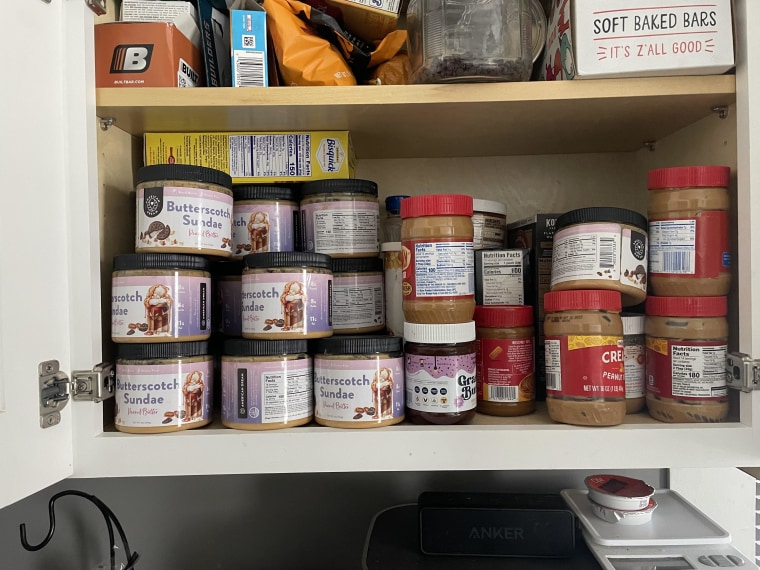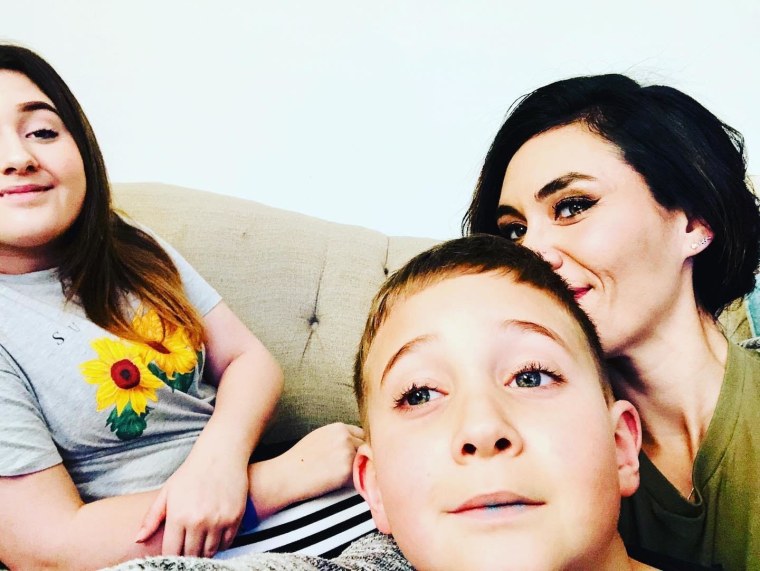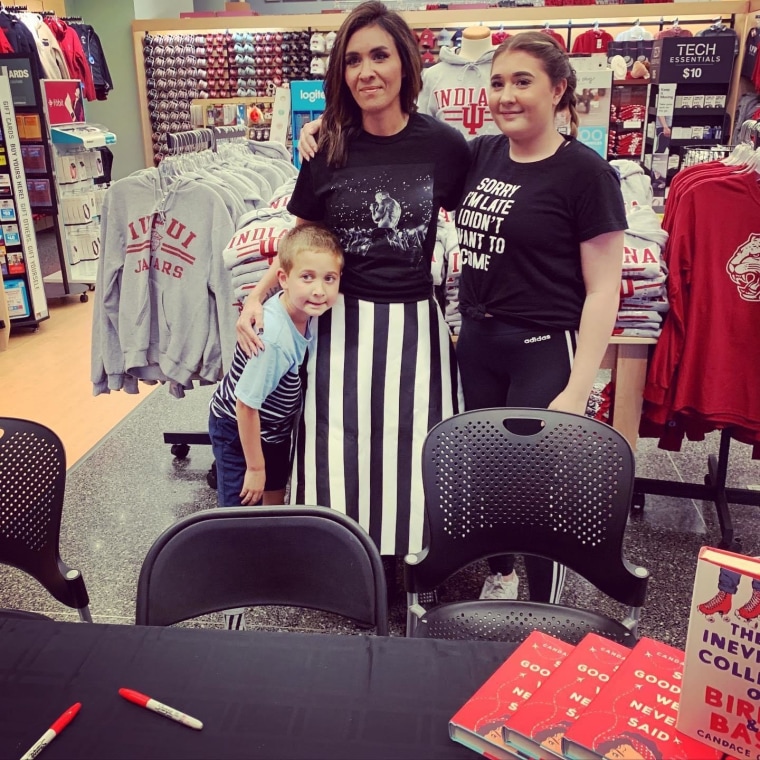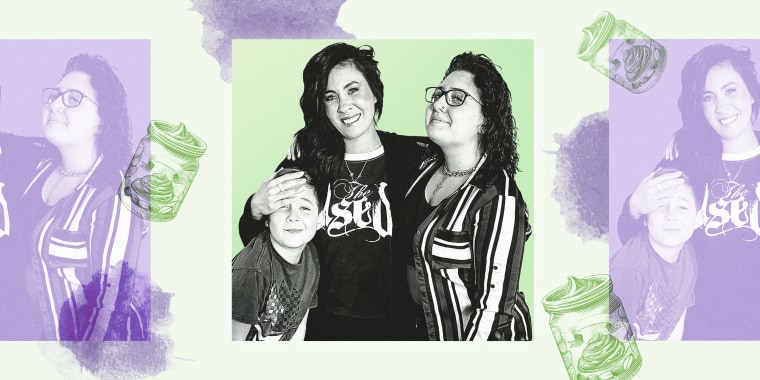My two children only know me one way: flawed.
Lilliana, 16, and Sullivan, 11, have spent many hours of their lives watching me painstakingly rearrange the 29 jars of peanut butter in the cupboard again and again and again and again — because it didn’t feel right the first three times. I never meant to accumulate that many, truly. It began the same way as any other compulsion — one jar at a time.
One jar became four became seven, and before I knew it, we had multiple cabinets full of various versions of peanut butter for reasons unbeknownst to anyone — including me. All I know is that until the spindles of my brain choose something different to latch onto, I need them. My kids have grown up knowing I won’t abandon my beloved snack until something inside releases the pressure and grants me permission.

Only then can we move on with our day. Yet some days I remain mentally and emotionally arrested. Maybe if I’d stacked them differently, my anxiety would lessen. Or, if I could rearrange them once more, I could escape my intrusive thoughts a little longer. Maybe.
My kids have always been aware of my obsessive-compulsive disorder (OCD). The extremely loud and often disturbingly intrusive voice in my head has been a part of my chemical makeup since childhood and has since followed me through decades of traumas, pregnancy, miscarriages, life-threatening childbirth, severe postpartum depression and an unexpected, tumultuous divorce.
But to my kids, I’m just “Mom.”
They’ve watched me stand catatonic in the grocery store, indecisive for hours on end over which brands to buy, and they don’t guilt me into hurrying. Though, there have been times when they were a lot younger and impressionable when they sensed my frustration and fed off of it, creating a vortex of anxiety. Maybe if I’d have kept calm, they would’ve, too. But that’s the part I never could get right.

My particular OCD has a time-specific element, so if the schedule dictates an event or appointment and I can’t stop myself from moving through a compulsive act again, time wins and my kids know that. The irony of it all is the most infuriating part because all I’ve ever wanted is more time and yet it’s the one thing I waste the most.
They’ve seen the way I tug at my neck or rub my knuckles in rapid succession or pinch my skin in repetition until it breaks open, and they aren’t embarrassed or ask why. They’ve heard me breathlessly count my steps or tiles or cracks or patterns on a fabric and they don’t question it.
They’ve witnessed a complete breakdown over a near-empty peanut butter jar getting thrown out and empathized because it became known I, for whatever reason my brain decided, couldn’t handle having them disappearing. Full, empty — it didn’t matter. I needed to keep them until that piece of my brain said to let them go.
There are many days I’ve traded precious playtime for endless hours of sweeping the floors or wiping the already clean counters over and over and over and over, and they’re the ones who grab me by the hand and remind me that I am OK — I am loved.
And, there are many days I’ve traded precious playtime for endless hours of sweeping the floors or wiping the already clean counters over and over and over and over, and they’re the ones who grab me by the hand and remind me that I am OK — I am loved.
It’s also normal for them to leave the house and come home to everything in an entirely different location because everything unsettled my bones. Over the years, they’ve accepted these fractured pieces of me as “normal,” but I worry they’ll grow up to wish they’d had something so very different; someone who isn’t me.

I was diagnosed at 7 after a traumatic event when I discovered the soothing effects of pinching my toes together in repetition. It snowballed and manifested into a bizarre cacophony of antics I still rely on to this day despite going through multiple forms of therapies. To be honest, it’s something I still don’t understand. But it doesn’t keep me from waking up with the hope that someday it can be better.
My kids have witnessed my many attempts at therapies and medications with little or no success and the frustrations that come with that. It’s exhausting and terrifying to know this is a forever battle and I will have to work to find relief — basically, that I’m in control, but I’m my own worst enemy. I’m the problem and the solution.
My all-consuming ritualistic, intrusive obsessions have disrupted my life for more than three decades and, most times, the lives of my sweet children. But not once have they complained, judged, or reprimanded me. If anything, my idiosyncrasies have taught them how to sympathize with those unlike themselves and how to truly be an ally to someone in need.
For that, I’m bursting with pride and strangely grateful for this journey.
If anything, my idiosyncrasies have taught them how to sympathize with those unlike themselves and how to truly be an ally to someone in need. For that, I’m bursting with pride and strangely grateful for this journey.
Despite the challenges of this monstrous disorder, parenting in this bittersweet symphony has forced me to restabilize even when I feel most unsteady. Whether during my divorce or the loss of a job, Lilliana and Sullivan have reminded me time and time again that I’m not my OCD. The cacophony of ridiculous tics and rigid routines and schedules and endless lists and intrusive thoughts are not who I am — I’m so much more.
Joanna Hardis, LISW-S, a therapist in Cleveland, Ohio, who specializes in OCD, tells TODAY that because OCD is so complex, it’s important to get a professional diagnosis if you suspect you may have the disorder, and not to rely on the internet for answers.
“OCD describes a process — there’s an anxiety-generating belief, the obsession, and an anxiety-reducing behavior that neutralizes or takes away the distress,” Hardis says. “That’s the compulsion. The compulsion can either be something you see or something you do in your head. The illness gets maintained when you engage in the process.”
Still, Hardis says it doesn’t have to be this way.
“When you learn how to experience the obsessions without the compulsions, you can break the cycle,” she says.
She recommends evidence-based treatment such as exposure and response prevention, or ERP, and acceptance and commitment therapy, or ACT.
OCD is brutal and parenting with it is even harder. I still fail all the time. For that, I feel an immense guilt. I’m more than an intricate web of steps and instructions and weird, fleeting moments I might miss or items I accumulate or seconds I count.
To my kids I’m just “Mom.” They love me, just as I am — flaws and all.
And that is everything.
